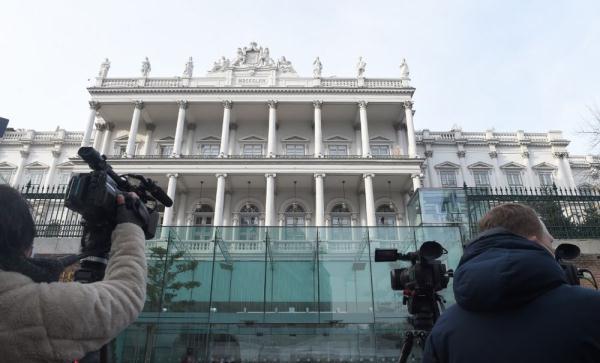Beijing, 13 Dec (Xinhua) -- The parties concerned to the JCPOA have held the seventh round of talks in Vienna, the capital of Austria, in recent days. An Iranian source with close ties to the Iranian delegation said on the 12th that the demands made by the European countries attending the meeting were excessive, resulting in slow progress in the talks.
In an interview with Iran's Tasnim news agency, the source said: "The excessive demands of three European countries, or one or two of them, have slowed down the negotiation process." ”

Media reporters photographed outside the Political Director-General of the Joint Commission on the Comprehensive Nuclear Agreement on Iran in Vienna, Austria, on November 29. (Photo by Xinhua reporter Guo Chen)
The person said that during the current round of talks, the attitude of one or two European countries has always been "not constructive" and "it is still the same today", and "the European side's insistence on this non-constructive position has led to differences between the five participating countries." ”
The three European countries participating in the Vienna talks are Britain, France and Germany.
When British Foreign Secretary Elizabeth Traus presided over the G7 Foreign Ministers' Meeting in Liverpool, England, on the 12th, she shouted to the Iranian side in harsh terms: "This is the last opportunity for Iran to negotiate with a serious solution to the problem, and the solution must be to agree to (fulfill) the terms of the Iranian nuclear agreement." This is their (Iran's) last chance, and they have to do it. ”
Germany's new foreign minister, Annalena Berberk, slammed Iran at the meeting. She said that the latest request made by the Iranian side in this round of talks has delayed the negotiation process and caused the Iranian side to "lose (our) great trust."
The scene of the meeting of the Political Director-General of the Joint Commission on the JCPOA on Iran, photographed on 9 December in Vienna, Austria. (Xinhua News Agency, courtesy of the EU Mission in Vienna)
Iran signed the JCPOA with the United States, the United Kingdom, France, Russia, China and Germany in 2015. Under the deal, Iran restricts its own nuclear activities, and the United Nations, the United States and the European Union lift economic sanctions against Iran.
In May 2018, the US government unilaterally withdrew from the Iranian nuclear agreement, and subsequently restarted and increased sanctions against Iran. Since May 2019, Iran has gradually suspended the implementation of some provisions of the JCPOA, but promised that the relevant measures are "reversible".
After the US Administration of Joseph Biden took office earlier this year, Iran and the United States showed their willingness to negotiate. The Iranian side stressed that the United States "illegally" withdrew from the Iranian nuclear agreement, and it is reasonable for the United States to first resume the implementation of the agreement and lift sanctions against Iran.
In order to encourage the United States and Iran to resume implementation of the agreement, the relevant parties have held six rounds of talks in Vienna since April this year. The Iranian side refused to negotiate with the US side on the grounds that the US side had withdrawn from the agreement. The US delegation negotiated indirectly with the Iranian side in Vienna by word of mouth. The seventh round of talks began on November 29, adjourned on the 3rd of this month, and continued on the 9th. (Wu Baoshu)
Source: Xinhua News Agency